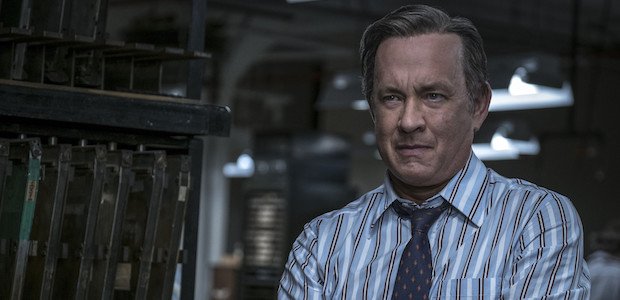In the past, there have been two types of Steven Spielberg films. Amistad, Lincoln, Saving Private Ryan and Schindler's List fall under the umbrella of Important Historical Significance, solemn movies that aim to educate while also allowing the masterful filmmaker to recreate moments from our collective past. On the flip side, Spielberg has his Popcorn Blockbuster itch that he regularly scratches in movies like Jurassic Park, the Indiana Jones franchise, Minority Report or Catch Me If You Can. Spielberg's goal in these exercises is mainly to entertain, using every trick in his bag to coax you to the edge of your seat and stay there for as long as he chooses to hold you in his grip.
The Post, Steven Spielberg's exceptional new film about the vitality of journalism, might be his first movie to weave both genres together, pouring a valuable history lesson into a briskly paced race-the-clock political thriller that pushes all the right buttons we need in a crowd-pleaser. Shot and edited in a seven-month span, The Post boasts a stunning ensemble of extraordinary character actors sinking their teeth into a riveting screenplay, all choreographed by a genius filmmaker who is firing on all possible cylinders. The Post is the best movie I saw this year, and likely the most important movie you'll see in several years.
Though set in the past, The Post speaks to our modern time. It lays out a handful of storylines, all centered around the acquisition of The Pentagon Papers, classified documents that seemed to prove that multiple U.S. administrations had misled the American public with regard to our motivations to stay involved in the Vietnam War. Daniel Ellsberg (Matthew Rhys), an opponent to the ongoing war effort, photocopied the documents and began leaking them to The New York Times. When President Richard Nixon filed an injunction against the Times preventing them from publishing any more information that was found in the Pentagon Papers, Washington Post editor Ben Bradlee (Tom Hanks) sensed an opportunity to carry the torch of journalism and bring the truth to his readers.
Simultaneously, the Washington Post was in financial straits (and if you wonder how relevant this subplot is, ask any journalist who still holds a newspaper job in 2017). Publisher Kay Graham (Meryl Streep) took over the family business following her husband's suicide, but faced a predominantly-male board that doubted her abilities. At the time that Bradlee was pushing his editorial team to acquire and publish the Pentagon Papers, thereby inviting the wrath of a vengeful U.S. President, Graham was facing heat from shareholders demanding that the Post do nothing to rock the boat of a potential financial merger that would bring stability to the paper during a time of need.
The Post is a rollicking journalism movie, easily the best of its kind that seamlessly joins the ranks of such crackling chase-the-breaking-story thrillers as All the President's Men and the recent Spotlight. (Screenwriter Josh Singer, who won an Oscar for Spotlight, does a pass on Liz Hannah's original The Post script, and their collaboration is spectacular.) But The Post seems even more entertaining because every line of the crisp and efficient script lands in the hands of an outstanding character actor, as Spielberg has recruited the deepest bench in recent acting memory. Aside from his two astounding leads (Streep and Hanks haven't been this good in years), The Post sets up and knocks down breathtaking scenes that feature the likes of Bob Odenkirk, Carrie Coon, Bradley Whitford, Alison Brie, Jesse Plemons, Sarah Paulson, Tracy Letts, David Cross and Bruce Greenwood. Seriously, for anyone obsessed with the nuts-and-bolts workings of how a Hollywood masterpiece can come together, Steven Spielberg's The Post can and will be a Master Class that is studied for decades by filmmakers, actors and below-the-line talents for generations to come.
On top of the exquisite craftsmanship that goes into the entirety of The Post, it's the timeless message that make this movie important today. Politics aside, the term "fake news" has become a buzzword aimed at facts one doesn't agree with, or seeks to discredit. Journalism is a tireless practice, and one dedicated to unearthing the truth, regardless of who it affects. The Post humanizes the men and women who tackle the difficult effort of following a developing story down every avenue, and bringing the results to the people, even when they might not want to hear what is revealed. Journalism is never not important, and the defense of a free press is a message that's crucial now, and important to audiences of any generation.
The Post is a fantastic film filled with incredible performances, all servicing an important message that speaks to our time. There isn't a false step in the entire production, and it's mind-blowingly inspirational that a filmmaker like Steven Spielberg can recognize the magnitude of a particular screenplay, recruit the best-of-the-best to help him tell it, and then deliver an airtight and intelligent package that entertains, informs, challenges and delights. The Post is, to me, the year's best film. See it at all cost.

Sean O’Connell is a journalist and CinemaBlend’s Managing Editor. Having been with the site since 2011, Sean interviewed myriad directors, actors and producers, and created ReelBlend, which he proudly cohosts with Jake Hamilton and Kevin McCarthy. And he's the author of RELEASE THE SNYDER CUT, the Spider-Man history book WITH GREAT POWER, and an upcoming book about Bruce Willis.











